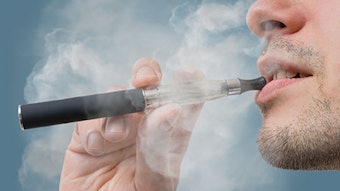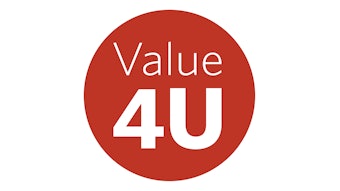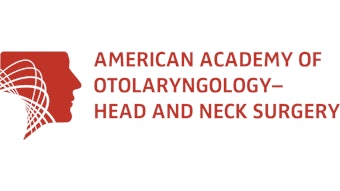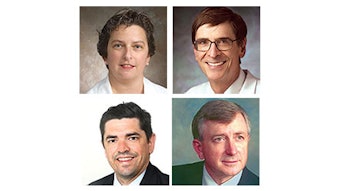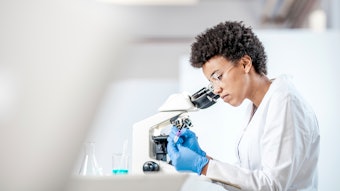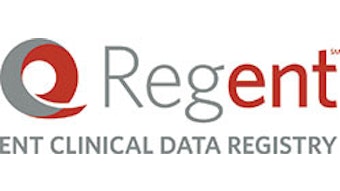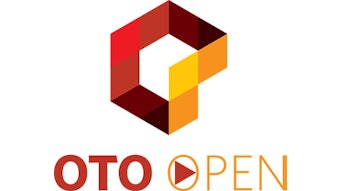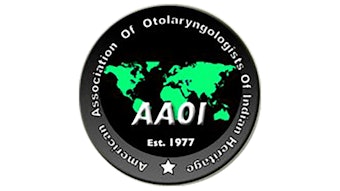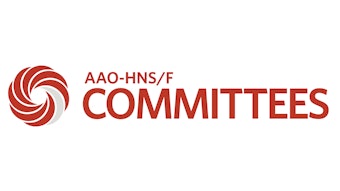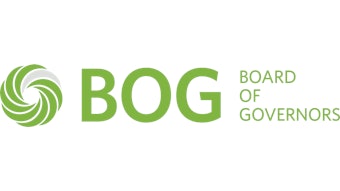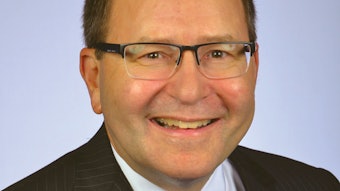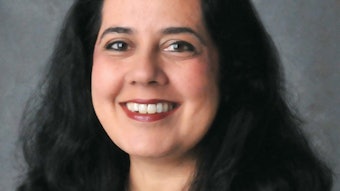Temporal bone lab brings hearing hope to Africa
Like many aspects of life in West Africa, otolaryngology training is difficult. Unlike the U.S., where most otolaryngology residency programs have facilities to teach temporal bone anatomy and dissection, West Africa until recently has had only a single two-station lab located in Lagos, Nigeria.
J. Douglas Green, Jr., MD
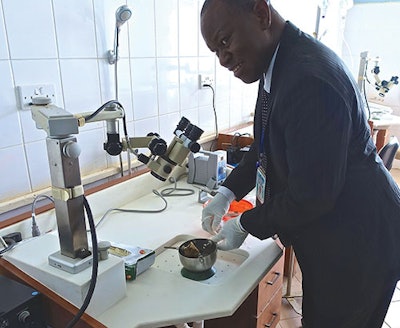 Samuel Adoga, MD, otolaryngologist at Jos University Teaching Hospital, Jos, Nigeria, in the new temporal bone laboratory. The lab is dedicated to the late Academy Member Jack Van Doren Hough, MD.
Samuel Adoga, MD, otolaryngologist at Jos University Teaching Hospital, Jos, Nigeria, in the new temporal bone laboratory. The lab is dedicated to the late Academy Member Jack Van Doren Hough, MD.
Through the efforts of Hearing Help for Africa, a 501(c)(3) organization dedicated to education, patient care, and providing hope to the people of Nigeria and West Africa, the first temporal bone laboratory in West Africa opened in May at the Jos University Teaching Hospital in Jos, Nigeria.
The eight-station temporal bone lab was originally located at Swedish Hospital in Denver, CO, and was used by the Cochlear Corporation to train many U.S. surgeons in cochlear implant surgery. The refurbished lab will be used by the otolaryngology residents at the Jos University Teaching Hospital as well as for temporal bone courses by surgeons from all parts of Africa, as provided through the West African College of Surgeons.
The new temporal bone laboratory is dedicated to the legacy of Jack Van Doren Hough, MD, who died in 2012 at the age of 92. Having traveled on several occasions to Africa, India, and Asia, Dr. Hough was deeply involved in medical missions and overseas medical education. He served on the board of MAP International (formerly Medical Assistance Program) and was a co-founder of both the Deafness Research Foundation and the Christian Society of Otolaryngology-Head and Neck Surgery.
As one of the true pioneers in stapes and cochlear implant surgery, many in our field know Jack’s legacy as a surgeon. Jack viewed his greatest contribution in helping to shape the lives of the surgeons, patients, and others that he influenced. As a young man, Jack delivered an address to a group of businessmen in Oklahoma City, OK, titled “Science, Philosophy, and Religion.” This quote from his address summarizes his life philosophy: “You have a great purpose in your life. You have a supreme destiny for which the great Designer has carefully prepared every atom and every talent of your being. It is a glorious purpose.”
Jack expressed his purpose in life viewing his work in the operating room, clinic, and medical missions as an expression of his deep faith. In doing so, he helped me and countless others find their purpose as well. Jack frequently quoted the following proverb when speaking about medical missions and education: “It is possible to give away and become richer.” The otolaryngology community in the U.S. and around the world is richer because of Jack’s purposeful life and legacy.
The laboratory dedication took place with Jack’s son, David Hough, PhD, an audiologist in Oklahoma City, OK, in attendance along with government officials, hospital administrators, physicians, and the local press.
Commitment to hearing
A recent study by Emmett, et al., has demonstrated the cost effectiveness of cochlear implantation in Nigeria, the most densely inhabited country in Africa. Interactions with patients and otolaryngologists during several mission trips to Nigeria have reinforced the significant need for cochlear implantation, mastoidectomy, and tympanoplasty surgery in Nigeria and throughout West Africa.
Founded in 2010, Hearing Help for Africa has provided 11 cochlear implants to Nigerians in Jos, Nigeria, remotely supporting the cochlear implant patients through a telemedicine connection in Jacksonville, FL. Dozens of Nigerian otolaryngologists and audiologists have been educated about the benefits of cochlear implantation and other areas of otology, such as tympanoplasty and mastoidectomy. Four otolaryngology professionals (two otolaryngologists, one nurse practitioner, and one audiology assistant) have traveled to Jacksonville for mini-fellowships to further their knowledge.
Nigerian government officials are supportive of these efforts to further develop cochlear implantation and specialty otolaryngology within other areas of Nigeria. Relationships have developed between Nigerian and U.S. otolaryngologists with plans for future collaborative efforts in speech therapy and audiology training, as well as the establishment of an oral/auditory school for the deaf.
Reference
Emmett SD, Tucci DL, Smith M, et al. GDP Matters: Cost effectiveness of cochlear implantation and deaf education in Sub-Saharan Africa. Otol Neurotol. 2015;36:1357-1365.

